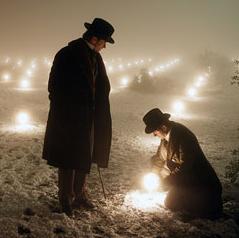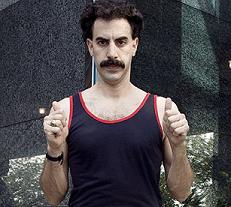 Laura Marshall (Laura Linney), an extreme religious fundamentalist, is the villain in “Driving Lessons,” a semi-autobiographical comedy written and directed by Jeremy Brock. But is Brock, who also incorporated spirituality into his adaptation of “The Last King of Scotland” (co-written with Peter Morgan), commenting on what he sees as the repressive nature of that type of religion?
Laura Marshall (Laura Linney), an extreme religious fundamentalist, is the villain in “Driving Lessons,” a semi-autobiographical comedy written and directed by Jeremy Brock. But is Brock, who also incorporated spirituality into his adaptation of “The Last King of Scotland” (co-written with Peter Morgan), commenting on what he sees as the repressive nature of that type of religion?
It didn’t seem that way when I talked to Linney, who plays the very British, very Christian, and–ultimately–very hypocritical mother of Ben (Rupert Grint of “Harry Potter” fame). Why? At heart, her character isn’t religious at all.
“What I loved about how this movie is formulated is that you have one woman who portrays herself as being spiritual but she’s actually theatrical,” Linney said recently in New York City. “And one woman who (acts) theatrical but actually is spiritual.”
That second woman is Evie Walton (Julie Walters), an aging actress based on Dame Peggy Ashcroft, who Brock worked for and befriended in his teens. In “Driving Lessons,” Walters and Linney battle over Grint: the former kidnapping him for camping excursions and a long road trip (he gets the impromptu “Driving Lessons” of the title), the latter stifling him with Bible study, long-winded lectures, and rehearsals for the church pageant.
“She used the religion for her own game,” Linney explained. “She liked the attention, so she would give in order to get. She liked being the person who gave the most, who did the most, so people could be dazzled by that. She was selfish, whether she was religious or not.”
In real life, Brock eventually abandoned what he called the “constraints” of his mother’s fundamentalism for liberal Christianity, and the differences between the two is one of the themes of “Driving Lessons.” In the film, the former is represented by Linney’s screen husband (Nicholas Farrell), a spineless vicar who stays home while his wife has an affair with the churchgoer playing Jesus in the pageant.
Linney found her character’s extremism “particularly fun to play,” and she hasn’t been this deliciously despicable onscreen since “The House of Mirth.” But was it hard for the actress to embody a character she didn’t morally agree with?
“No,” Linney said. “You just have to not judge them. And if you ask yourself ‘why’ all the time it makes you think about things and people in a different way. It gives you a different perspective, which I think is good to know.”


